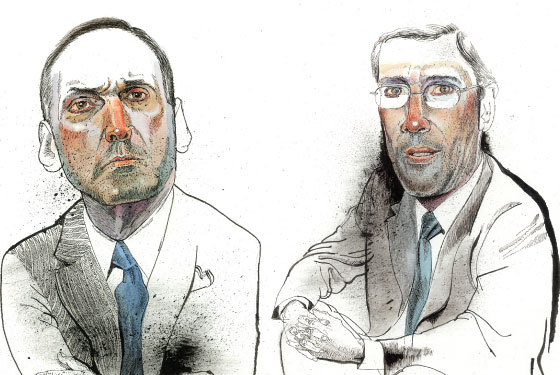
Illustrations by Jack Unruh
Most CEOs will say that the reason they make so much money is that they make so many important decisions. That’s not exactly true. Anyone who can persuade the board of a big American company to let him sit in the CEO chair will make a killing—no matter what decisions he makes. But the decisions are indeed crucial. And the difference between wise ones and catastrophic ones is often quite subtle.
Merrill Lynch and Lehman Brothers just offered a vivid display of how quickly bad CEO decisions can destroy once-proud firms. Despite all the talk of perfect economic storms, crashing markets, and nefarious short-sellers, what nuked Merrill and Lehman was human error.
In rising markets, the decision to take huge risks mints money and showers glory on a firm’s CEO: Merrill’s and Lehman’s stock doubled over two years. Merrill’s former CEO, Stan O’Neal, was hailed as the leader the firm had always needed, and at Lehman, Dick Fuld’s legend was sealed. Anyone who tells you that CEOs like O’Neal and Fuld “did it for the money” is dreaming. They had plenty of money. They did it because they wanted to win. (By the way, did O’Neal and Fuld know they were betting their firms? Almost certainly not. On Wall Street, it is assumed that if something has never happened before, it will never happen. And because the working definition of “never happened before” usually means “not in the past few years,” traders can convince themselves of all sorts of happy things.)
If both firms made similar decisions on the way up, why, on the way down, did Merrill’s shareholders get a $50 billion consolation prize while Lehman’s shareholders got obliterated? Because of how Fuld and Merrill’s current CEO, John Thain, played their hands. Thain started out with one big advantage: He was brought in to clean up someone else’s mess; Fuld first had to admit he had a problem, and that has never been his strong suit. When threatened, his style is to start throwing punches. He is a former trader—a breed known for their brash personalities—and before that Fuld left the Air Force after getting in a fight with a superior. (It’s worth noting that he was said to have been defending a cadet against unfair treatment by the superior.)
Fuld blamed the plummeting stock price on short-sellers, then on his lieutenants. In the last weeks of the crisis, he passed on many chances to save Lehman, convinced that everything would turn around. But the onset of the worst financial crisis since the Great Depression is not the best time to be a fighter. It’s the time to be a conciliator like Thain: to surrender to a higher power and do whatever you need to do to survive.

• James J. Cramer on Post-Crisis Wall Street
• The Greed & Fear Guru Surveys the Future
• How a Lehman Trader Copes With Income Shrinkage
• How a Smaller Wall Street Will Change Us
• Could Morgan Stanley’s Fate Be Different?
• How Financial Firms Are Like Naughty Kids